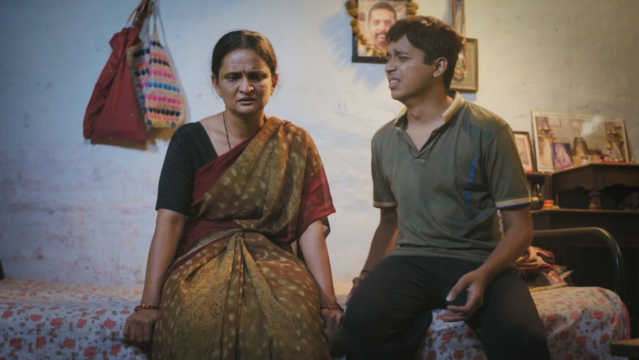
Keyur Seta
Mumbai, 02 Aug 2019 7:00 IST
Updated: 03 Aug 2019 12:02 IST
Director Raj R Gupta's Baba is Dobriyal's debut in Marathi cinema but he didn't need to speak the language.

Acting in a film made in a language you are not familiar with can never be easy. Not only does one need to learn a new language, but one also has to get the diction, intonation, even lilt right.
Hindi film actor Deepak Dobriyal did not face this challenge while making his debut in Marathi cinema with Baba. He plays a deaf and mute person in the film.
That does not mean Dobriyal had no challenge. If anything, it was bigger, as he had to express himself without words. On top of that, his character is present in almost every scene. But Dobriyal comes out a winner with his gestures and facial expressions, which never fail to touch you. Be it delight, sadness, frustration or anger, he masters all the emotions.
Baba, however, struggles to rise to the level that such a powerhouse performance demanded.
Directed by first-time director Raj R Gupta, Baba is set in the year 1990 in the interiors of Maharashtra. Madhav (Dobriyal) and wife Anandi (Nandita Patkar) live a contented life with their son Shankar (Aryan Meghji). Their financial condition isn’t anything to boast about, but they are happy in their little world.
Madhav and Anandi are deaf and mute since birth. Although Shankar is neither, he has not been able to learn to speak as both his parents can't and he has never been to school. Madhav’s best friend Trambak (Chittaranjan Giri) stammers.
The family’s peaceful life comes to a sudden halt when a rich couple from Pune, Pallavi (Spruha Joshi) and Rajan (Abhijeet Khandkekar), land up at their doorstep with a policeman. The couple claims Shankar is their child, much to the shock of Madhav and Anandi. Pallavi and Rajan take the help of the courts to get Shankar’s custody. But are they really Shankar’s parents?
The mythological tale of Krishna, who was born to Devaki but brought up by Yashoda, has fascinated storytellers for centuries. We saw this even last year in Marathi cinema with the delightful Naal (2018). And we see the same theme in Baba, though presented in a different way.
Raj R Gupta succeeds in establishing the bond among Shankar, Madhav and Anandi and the simplicity of village life. Though the family is poor, the focus is not on their poverty but on them enjoying the simple pleasures of life. The song 'Adgula Madgula' sums up their situation well. You cannot but feel sympathetic towards the lead characters and you root for Madhav and Anandi to get Shankar back.
Meghji and Patkar’s convincing performances also play a key role here. Like Dobriyal, they, too, had the difficult task of expressing themselves wordlessly. Meghji’s finesse at such a young age is noteworthy. Anandi's unflinching possessiveness towards Shankar is her biggest strong point.
Baba gains your interest more as the action shifts to the court with the first hearing ending the first half in a fine manner, raising expectations of more drama in the second. But then the focus shifts from the case and goes round in circles. The incident of the guy with a parrot seems purposeless while the idea of making Shankar speak so that Madhav and Anandi can get his custody does not make sense because the court gives more weight to the financial condition of the parents to decide custody.
Rajan and Pallavi share a strange bond. The man apparently agreed to marry her despite knowing she cannot truly love him. But we are never told the reason why. Moreover, this subplot was not even necessary.
Baba's second-half is unable to match the brilliance of its three lead artistes. Still, the film has enough going for it, especially because of the final scene.
You might also like

Review Marathi
Samaira review: This well-intentioned travel drama suffers from a dull script
Actor Rishi Deshpande's directorial debut doesn't rise as much as its performances. ...

Review Marathi
Goshta Arjunchi review: Triggering conversations about mental health
Anupam Barve’s short film urges people to talk to their families about what they are going...

Review Marathi
Ekda Kaay Zala review: Sumeet Raghvan impresses in a film that does not use its full potential
Directed by Dr Saleel Kulkarni, the film has a fine act by child artiste Arjun Purnapatre....

